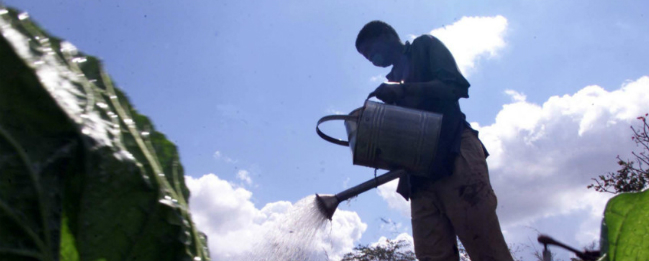Imagine only having a third of the food you need to feed your family.
Imagine seeing your small stocks of food dwindle. Imagine fearing that in a few weeks’ time, you won’t be able to feed your children at all. This is the reality right now for millions of people in Malawi as they suffer the effects of the worst drought Southern Africa has seen for 35 years. The El Niño weather phenomenon, exacerbated by climate change, has caused long dry spells in some areas and flooding in others, destroying crops and decimating harvests. Much of Malawi depends on growing maize – but it is one of the most vulnerable crops to drought.
Stezia Ziyangoyango’s family relies on what they grow on their small farm in Ntcheu district in southern Malawi. In good times she and her husband could depend on getting 20 bags of maize each year. This was enough to feed their family of eight with enough left over to sell to make some extra money. This year, because of the drought, they harvested only seven bags. They’ve already cut back to two meals a day to make the maize last longer. Ziyangoyango estimates that even with this sacrifice food will run out in August. “I do not know how I will feed my children,” she
told my Oxfam colleague. “The few sweet potatoes we grow will not last even one month. We have nothing to sell except just a few tools, but the price will be so low, as everyone will be doing the same. And then what would we do at planting time?”
Throughout Malawi conditions are the same, and Oxfam teams are meeting family after family with stories like Stezia’s. Harvests have completely failed, or are much lower than usual. As water sources dry up, women and girls must travel farther to collect water. Some families are resorting to using unsafe surface water as their only option, increasing their vulnerability to water-borne disease, including cholera. The Malawian Government has declared a ‘State of Natural Disaster’ and announced that 6.5 million people are facing food insecurity over the course of 2016 to
mid-2017. This figure includes around 975,000 children under two years old who are at particularly high risk of food insecurity and malnutrition.
Oxfam is working in coordination with the Government of Malawi and other agencies to reach the most vulnerable people, focusing on ‘hotspot’ areas where food is short and families are most in need. A total of £12 million is needed for Oxfam to provide aid to 650,000 people in Malawi until mid-2017 – but right now our response is worryingly under-funded. Support from the international community is urgently needed. Scotland has long-lasting links with Malawi, built on deep people-to- people connections. We’re now asking the people of Scotland to support those in crisis in
Malawi by donating to our new appeal. The Scottish Government is matching pound-for- pound the first £70,000 of all public donations to our appeal, meaning supporters can make twice the impact with their donation.
This support is hugely welcome, and builds on the Government’s long-term development investment to Malawi. This includes our own project which is supporting thousands of Malawian small holder farmers, particularly women, in many areas affected by the current drought. The Government’s willingness to join with us to mitigate the risk of the drought undermining wider development progress is critical. Oxfam is already providing drought resistant crops like sweet potato vines, to enable affected families to continue cultivation even in dry conditions. Rose Usi from Balaka’s
Njale village said, “the potatoes have come to my family’s rescue”;. Projects such as these not only give people food, but also build their farming skills so they can better respond to the challenge of climate change.
In June, Oxfam helped over 29,000 people in Balaka district with sweet potato vines, maize and vegetable seeds and fertilisers. We are currently preparing to support 83,000 more people – but more funds are urgently needed to make this happen as quickly as possible. From April to May 2016, Oxfam also provided over 200,000 people with money in Mulanje, Lilongwe and Kasungu districts. By doing so, we are not only supporting individuals and their families, but also helping to sustain local markets. Hunger isn’t inevitable. Lives can be saved and livelihoods restored in Malawi. We urge
the people of Scotland to help us prevent any more Malawians from going hungry. Donate to the Oxfam Malawi appeal: https://oxf.am/Z2pA
Originally published in Friends of the Scotsman, July/August 2016, by Jamie Livingstone, Head of Oxfam Scotland
